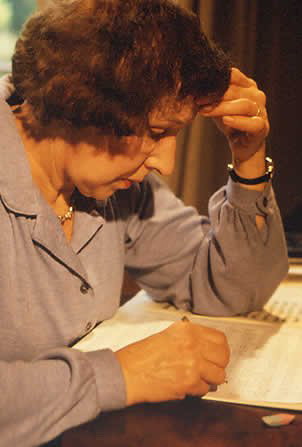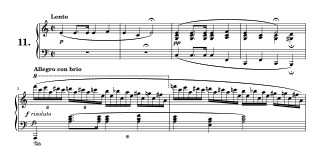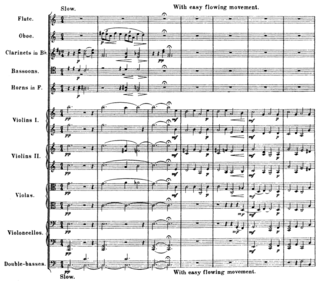Related Research Articles

Musical composition can refer to an original piece or work of music, either vocal or instrumental, the structure of a musical piece or to the process of creating or writing a new piece of music. People who create new compositions are called composers. Composers of primarily songs are usually called songwriters; with songs, the person who writes lyrics for a song is the lyricist. In many cultures, including Western classical music, the act of composing typically includes the creation of music notation, such as a sheet music "score", which is then performed by the composer or by other musicians. In popular music and traditional music, songwriting may involve the creation of a basic outline of the song, called the lead sheet, which sets out the melody, lyrics and chord progression. In classical music, orchestration is typically done by the composer, but in musical theatre and in pop music, songwriters may hire an arranger to do the orchestration. In some cases, a pop or traditional songwriter may not use written notation at all and instead compose the song in their mind and then play, sing or record it from memory. In jazz and popular music, notable sound recordings by influential performers are given the weight that written or printed scores play in classical music.
Ronald Binge was a British composer and arranger of light music. He arranged many of Mantovani's most famous pieces before composing his own music, which included Elizabethan Serenade and "Sailing By".

John Milton Cage Jr. was an American composer and music theorist. A pioneer of indeterminacy in music, electroacoustic music, and non-standard use of musical instruments, Cage was one of the leading figures of the post-war avant-garde. Critics have lauded him as one of the most influential composers of the 20th century. He was also instrumental in the development of modern dance, mostly through his association with choreographer Merce Cunningham, who was also Cage's romantic partner for most of their lives.
Sheet music is a handwritten or printed form of musical notation that uses musical symbols to indicate the pitches, rhythms, or chords of a song or instrumental musical piece. Like its analogs – printed books or pamphlets in English, Arabic, or other languages – the medium of sheet music typically is paper. However, access to musical notation since the 1980s has included the presentation of musical notation on computer screens and the development of scorewriter computer programs that can notate a song or piece electronically, and, in some cases, "play back" the notated music using a synthesizer or virtual instruments.

George Henry Crumb Jr. was an American composer of avant-garde contemporary classical music. Early in his life he rejected the widespread modernist usage of serialism, developing a highly personal musical language which "range[s] in mood from peaceful to nightmarish". Crumb's compositions are known for pushing the limits of technical prowess by way of frequent use of extended techniques. The unusual timbres he employs evoke a surrealist atmosphere which portray emotions of considerable intensity with vast and sometimes haunting soundscapes. His few large-scale works include Echoes of Time and the River (1967), which won the 1968 Pulitzer Prize for Music, and Star-Child (1977), which won the 2001 Grammy Award for Best Contemporary Classical Composition; however, his output consists of mostly music for chamber ensembles or solo instrumentalists. Among his best known compositions are Black Angels (1970), a striking commentary on the Vietnam War for electric string quartet; Ancient Voices of Children (1970) for a mixed chamber ensemble; and Vox Balaenae (1971), a musical evocation of the humpback whale, for electric flute, electric cello, and amplified piano.

Rosemary Isabel Brown was an English composer, pianist and spirit medium who claimed that dead composers dictated new musical works to her. She created a small media sensation in the 1970s by presenting works purportedly dictated to her by Claude Debussy, Edvard Grieg, Franz Liszt, Franz Schubert, Frédéric Chopin, Igor Stravinsky, Johann Sebastian Bach, Johannes Brahms, Ludwig van Beethoven, Robert Schumann and Sergei Rachmaninoff.

An étude or study is an instrumental musical composition, usually short, designed to provide practice material for perfecting a particular musical skill. The tradition of writing études emerged in the early 19th century with the rapidly growing popularity of the piano. Of the vast number of études from that era some are still used as teaching material, and a few, by major composers such as Frédéric Chopin, Franz Liszt and Claude Debussy, achieved a place in today's concert repertory. Études written in the 20th century include those related to traditional ones and those that require wholly unorthodox technique.

Albert William Ketèlbey was an English composer, conductor and pianist, best known for his short pieces of light orchestral music. He was born in Birmingham and moved to London in 1889 to study at Trinity College of Music. After a brilliant studentship he did not pursue the classical career predicted for him, becoming musical director of the Vaudeville Theatre before gaining fame as a composer of light music and as a conductor of his own works.
The Mephisto Waltzes are four waltzes composed by Franz Liszt from 1859 to 1862, from 1880 to 1881, and in 1883 and 1885. Nos. 1 and 2 were composed for orchestra, and later arranged for piano, piano duet and two pianos, whereas nos. 3 and 4 were written for piano only. Of the four, the first is the most popular and has been frequently performed in concert and recorded.
Howard While Skempton is an English composer, pianist, and accordionist.
Haydn Wood was a 20th-century English composer and concert violinist, best known for his 200 or so ballad style songs, including the popular Roses of Picardy.

Sir George Dyson was an English musician and composer. After studying at the Royal College of Music (RCM) in London, and army service in the First World War, he was a schoolmaster and college lecturer. In 1938 he became director of the RCM, the first of its alumni to do so. As director he instituted financial and organisational reforms and steered the college through the difficult days of the Second World War.

On Hearing the First Cuckoo in Spring is a tone poem composed in 1912 by Frederick Delius. Together with Summer Night on the River it is one of Delius's Two Pieces for Small Orchestra. The two were first performed in Leipzig on 23 October 1913, conducted by Arthur Nikisch.On Hearing the First Cuckoo in Spring is the longer of the two pieces, with a typical playing time of between six and seven minutes. There have been numerous recordings of the piece, which Delius's champion Sir Thomas Beecham described as much the best known of the composer's works.

Isidor Edmond Philipp was a French pianist, composer, and pedagogue of Jewish Hungarian descent. He was born in Budapest and died in Paris.

The Dolly Suite, Op. 56, is a collection of pieces for piano duet by Gabriel Fauré. It consists of six short pieces written or revised between 1893 and 1896, to mark the birthdays and other events in the life of the daughter of the composer's mistress, Emma Bardac.
Music of Changes is a piece for solo piano by John Cage. Composed in 1951 for pianist and friend David Tudor, it is a ground-breaking piece of indeterminate music. The process of composition involved applying decisions made using the I Ching, a Chinese classic text that is commonly used as a divination system. The I Ching was applied to large charts of sounds, durations, dynamics, tempo and densities.
Tibor Harsányi was a Hungarian-born composer and pianist.
Richard Causton is an English composer and teacher.
The music of the video game Final Fantasy XIII was composed by Masashi Hamauzu. Former regular series composer Nobuo Uematsu did not contribute any pieces to the soundtrack. Music from the game has been released in several albums. The main soundtrack album, Final Fantasy XIII Original Soundtrack, was released on four Compact Discs in 2010 by Square Enix, the developers and producers of the game. Selections from the soundtrack have been released on two gramophone record albums, W/F: Music from Final Fantasy XIII and W/F: Music from Final Fantasy XIII Gentle Reveries, both in 2010 by Square Enix. An album of arranged pieces from the soundtrack, Final Fantasy XIII Original Soundtrack -PLUS-, was also released by Square Enix in 2010, as was an album of piano arrangements, Piano Collection Final Fantasy XIII. The theme song for the Japanese version of the game, "Kimi ga Iru Kara", was released as a single by For Life Music in 2009.
Philip Hammond is an Irish composer. He has also been a teacher, writer and broadcaster.
References
- ↑ Willa Cather (1970-01-01), The World and the Parish, ISBN 978-0803215450
- ↑ Olin Downes (November 2008), The Lure of Music, ISBN 9780559617263
- ↑ Edward Baxter Perry (August 2008), Stories of Standard Teaching Pieces, ISBN 9780554709413
- ↑ Colin Larkin (2002), The Virgin encyclopedia of fifties music, ISBN 9781852279370
- ↑ MacKenzie, Sir Compton; Stone, Christopher (1952), "Instrumental and Novelty", The Gramophone, 30